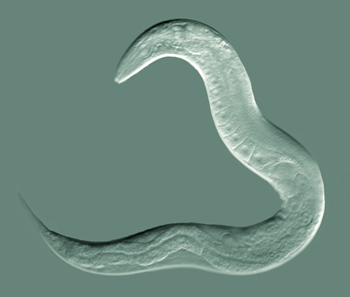We're open daily! View holiday hours
Science News
Longevity from Space Travel
July 11, 2012

As astronauts spend more time in space—aboard the International Space Station (ISS), and potentially in deep space travel—researchers wonder how exposure to space affects aging.
Enter Caenorhabditis elegans, or C. elegans, scientists’ favorite worm. C. elegans has traveled on many spaceflights, making it the perfect study for aging and space travel.
Lifespan and aging rates in animals are influenced by numerous environmental factors, such as temperature, oxygen, and food intake. The effect of microgravitational space environments on aging remains poorly understood, in part because scientists must disentangle it from many other influences.
To address the question of spacefaring worms’ longevity, Yoko Honda of the Tokyo Metropolitan Institute of Gerontology examined ISS-flown C. elegans and compared them to earth-bound worms.
During the International C. elegans Experimental First project, scientists incubated worms and flew them for two days to the ISS. The worms resided on-board for nine days, and then returned to Earth to be flash frozen in liquid nitrogen. Control animals underwent the same procedures at the same time on the ground.
First off, the team noted that spaceflight suppressed the formation of particular compounds that normally accumulate with increasing age.
Secondly, the team looked at how spaceflight affected specific genes’ expression (not whether the genes smiled or frowned, but how efficiently the genes transfered the information they encode into actual proteins). The space travel downregulated seven of the worms’ genes: these genes encode proteins linked to neuronal or endocrine signaling. Honda and his colleagues observed that the inactivation of each of these genes led to an extension of the worms’ lifespan on the ground. So when the scientists “turned off” the genes that slowed down in space, the worms lived longer.
Space travel leads to longevity? Well, perhaps in worms. Further research is required, but the present study suggests that space-flown worms age more slowly compared with the control group, and hints that spaceflight may extend worm lifespan. Can astronauts hope for similar results? Far too early to tell…
The research appears in the current edition of Scientific Reports.
Image: Bob Goldstein, UNC Chapel Hill, Wikipedia